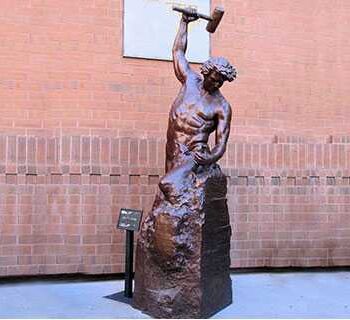
Self-Improvement Benjamin Franklin Style
Self- Improvement Benjamin Franklin Style
By: Bro. Jeffrey Lanzet
I am sure all Brother’s are aware that Benjamin Franklin was one of the Founding Fathers of this country, a great inventor and a Master Mason. Did you know that Benjamin Franklin was also an accomplished author, and musician (harp, violin, and guitar.) Franklin also founded many civic organizations including The University of Pennsylvania.
How did Benjamin Franklin find the time to accomplish so much in such a short time. Was he a genius? Did he have some sort of photographic memory or other extra sensory perception that we all lack? I would wager this is not the case. That is not to say that Benjamin Franklin was not brilliant or extraordinary, as we all know he was. It was more about the approach.
The key to Benjamin Franklin’s success was creating a list of values to live by (He often referred to them as the 13 Virtues) which include many that are very familiar to the Masonic Community including:
1) Temperance-Eat not to dullness and drink not to elevation.
2) Silence-Speak not but what may benefit others or yourself. Avoid trifling conversation.
3) Order-Let all your things have their place.
4) Resolution-Resolve to perform what you ought, perform without fail what you resolve.
5) Frugality-Make no expense but to do good to others or yourself (waste nothing).
6) Industry-Lose no time. Cut off all unnecessary actions.
7) Sincerity-Use no hurtful deceit. Think innocently and justly; and if you speak, speak accordingly.
8) Justice-Wrong none, by doing injuries or omitting the benefits that are your duty.
9) Moderation-Avoid extremes. Forebear resenting injuries so much as you think they deserve.
10) Cleanliness- Tolerate no uncleanliness in body cloths or habitation.
11) Chasity-Rarely use venery but for health or offspring. Never to dullness, weakness or the injury of your own or another’s peace or reputation.
12) Tranquility-Be not disturbed at trifles, or at accidents common or unavoidable.
13) Humility-Imitate Jesus and Socrates.
Franklin would not try to improve all of these virtues at once, but rather one at a time. He would move on to the next after he had mastered the prior virtue. He would keep a diary of each virtue and put a mark next to each at the end of the day if he committed a fault. This would enable him to build a daily routine that centered around self -improvement and helping others.
In reading excerpts of Franklin’s daily schedules from his autobiography there are 10 important productivity lessons that become apparent:
1. Keep it simple- no overwhelming to do lists but rather razor focus on the essential and highly effective.
2. Go to bed and wake up the same time each day-“Early to bed and early to rise makes a man healthy wealth and wise. This was on of Franklin’s most popular mantras.
3. Spend quiet time alone in prayer or meditation. This helped to give him the clarity and focus to plan the day and follow through.
4. Set your intention or plan for the day-Each morning before work Franklin would ask himself “What good shall I do this day?” This helps to ensure you stay focused on the most important tasks and not get caught up in all the small stuff.
5. Dedicate time for learning. Franklin would spend time reading books and papers. This time could be used for learning a language or playing a musical instrument.
6. Create time blocks for deep and shallow work. Franklin allocated 2 four hour time blocks from 8 am till 12 pm and from 2 pm to 6 pm for deep work and uninterrupted focus on his most important tasks. Franklin also allocated a 2 hour time block from 12 pm to 2 pm for lunch and shallow work (ie. reviewing his finances)
7. Put things back in order after work. Clean up workspace and put everything back in order before ending the workday.
8. Schedule downtime. After work Franklin would eat dinner spend time relaxing, playing music or visiting with friends. This allowed Franklin to re-energize the brain and body for the challenges of the next day.
9. Reflect on your day in the evenings. What good have I done today? Franklin would note good and bad parts of his day and would look to change and improve his daily schedule for better productivity.
10. Don’t aim for perfection. What matters most is improvement not perfectionism. Celebrate your small wins and do not beat yourself up when you fall short of your plans. It is the effort that really counts.
Benjamin Franklin adopted this methodology over 300 years ago. I think he still sets the bar for how to improve oneself and be a more productive person. I hope that this article helps to make 2021 a better year and us better men. Happy New YEAR!!!!
- Posted by Jeffrey Lanzet
- On December 29, 2020
- 1 Comment



1 Comment